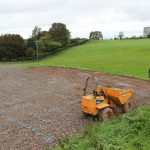Recent court ruling against ribbon development in NI indicates self-builders could be denied planning permission in some greenbelt areas.
In this article we cover:
- What is ribbon development
- Impact on planning policies
- Court of Appeal’s findings
In a potential landmark legal win, environmental activist Gordon Duff’s challenge to a planning decision by the Newry, Mourne and Down District Council could have “far-reaching” implications for rural development.
The Irish News reported that The Court of Appeal ruled in favour of Mr Duff, who contended that the council’s approval of ‘infill’ planning permission for two houses and garages along a rural road near Ballynahinch, Co Down contravened planning policy on ribbon development (when houses or buildings are built one after the other along a road).
Mr Duff emphasised the ruling’s broader significance, predicting, “It’s a precedent and will potentially affect thousands of similar planning applications over the next few years.”
All other infill planning applications to local authorities will have to consider the court’s decision.
The case revolved around an application in April 2021 to construct two detached houses and garages on Glassdrumman Road, Ballynahinch. Representing himself, Mr Duff challenged the council’s approval of outline planning permission. He argued that the decision would contribute to ribbon development contrary to guidelines that preserve rural character and habitats.
While accepting that application constituted ribbon development, the council argued that Policy CTY8 allowed for a limited exception permitting a maximum of two houses in small gap sites.
However, after his initial judicial review challenge was dismissed, Mr Duff mounted an appeal to rescind the planning decision.
He contended that the council’s decision was unsupported by the facts and wrong in law.
The Court of Appeal judges highlighted CTY8’s “strong unambiguous language” about denying applications which will add to ribbon development.
“This is an inherently restrictive policy such that, unless the exception is made out, planning permission must be refused,” Lord Justice Treacy said, reports the Irish News.
The judge found it unreasonable to consider a large open space in undeveloped land at the Glassdrumman Road site as part of the front of an existing property.
“Where the infill exception is being relied upon a key question is whether there is a substantial and continuously built up frontage,” he stated.
“That question must be addressed in light of the purpose of the policy and its inherently restrictive nature, and, of course, with proper regard for the physical features of the area in question.”
“This appeal is allowed. The decision will be quashed,” affirmed the judge, confirming the necessity of adhering to policies aimed at preserving the rural landscape and habitats of Northern Ireland.










